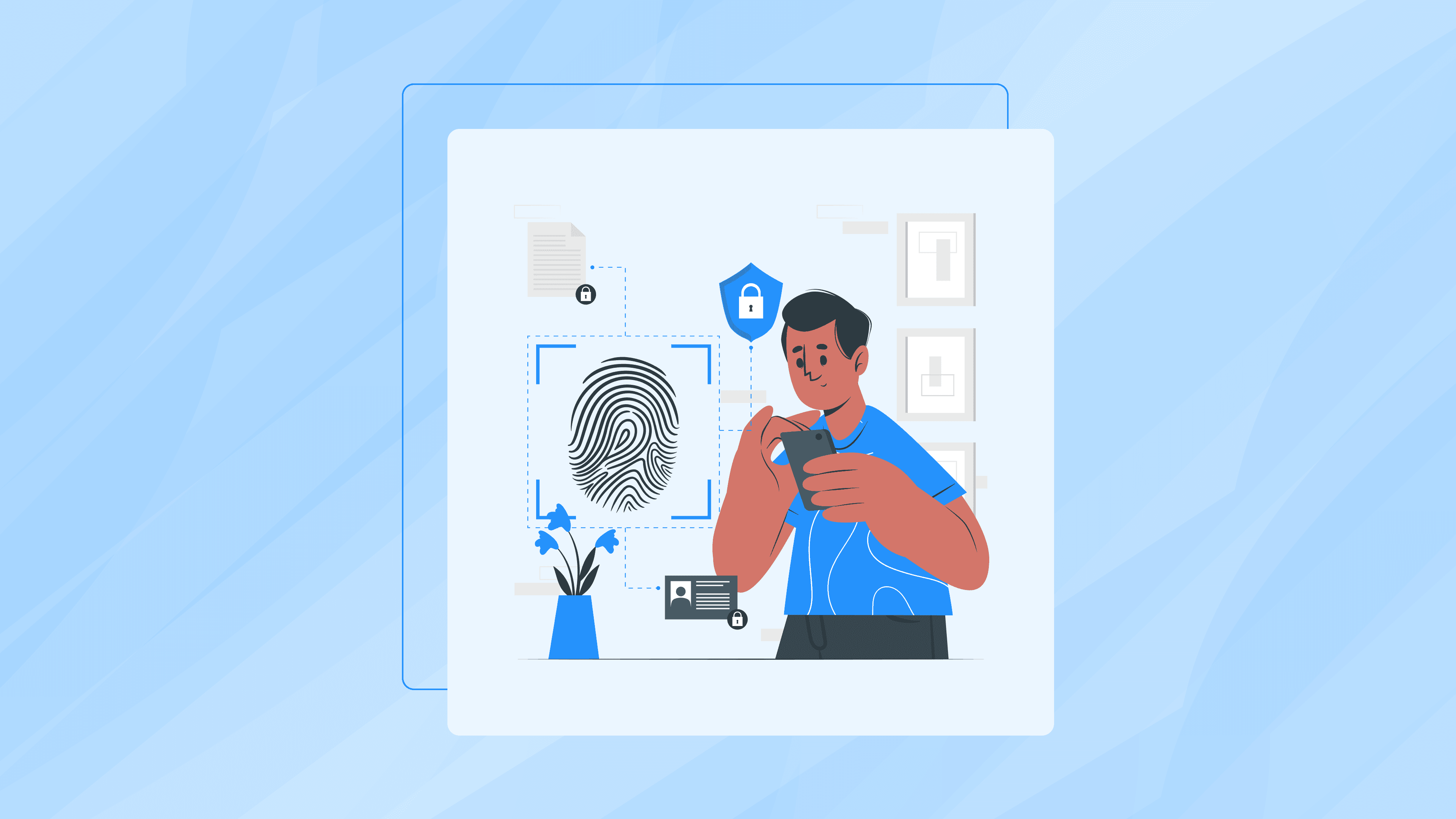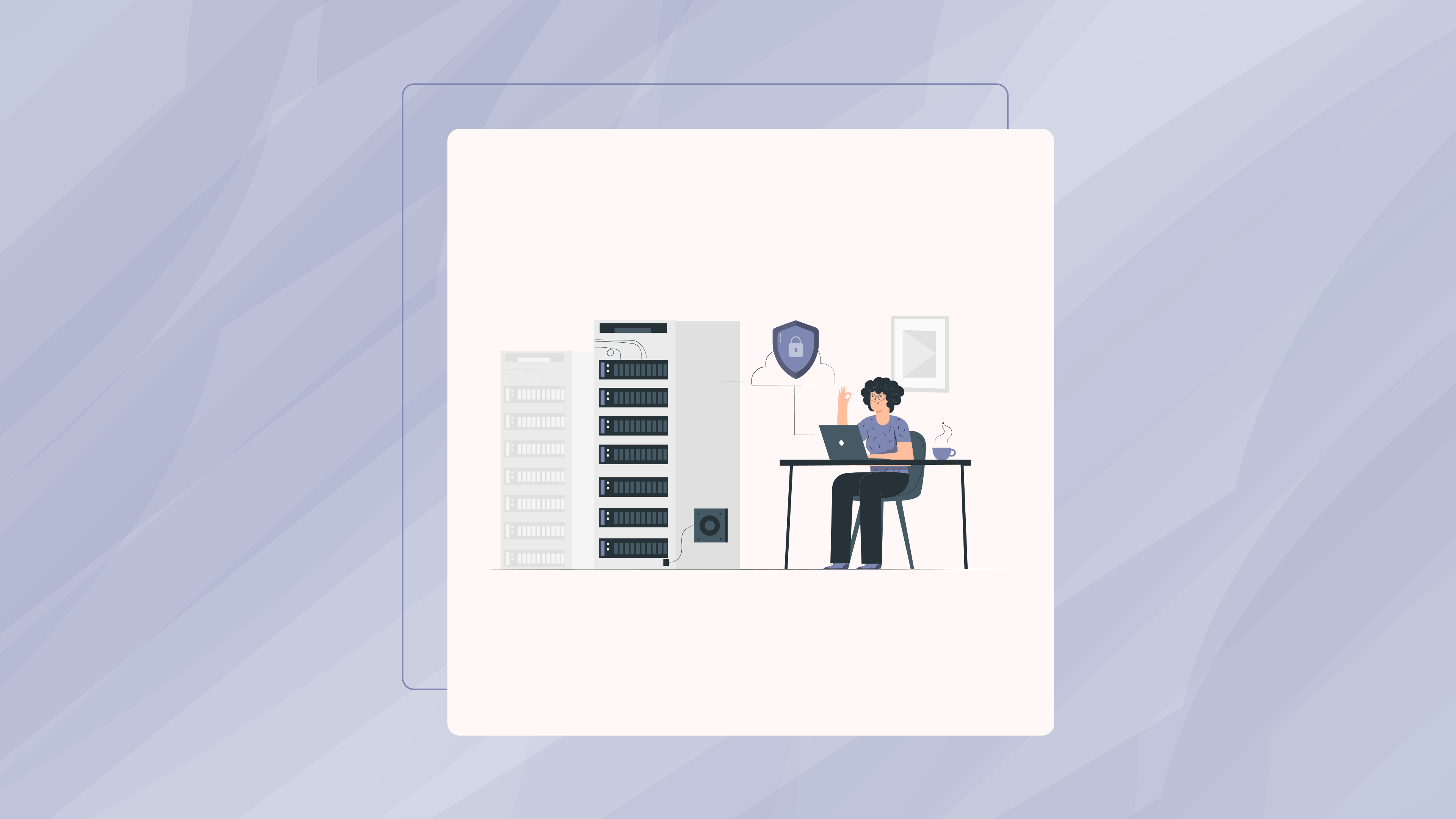Blockchain
How Blockchain Secures Our Digital identity?
How Blockchain Secures Our Digital identity?
How Blockchain Secures Our Digital identity?
How Blockchain Secures Our Digital identity?
Oct 14, 2024



In the age of digital our personal information is more vulnerable than ever before. With the high rate of data breaches, identity theft, and privacy concerns, securing digital identity has become a challenging task for the big organizations and companies. Here Blockchain technology Enter, a revolutionary solution that promises enhanced security and control over personal data.
In this blog, we’ll explore how blockchain helps secure our digital identities and why it matters for our future.
What is Digital Identity?
Digital identity refers to a secure, decentralized, and tamper-proof way of representing, verifying, and managing the identity of individuals, organizations, or devices in the digital world.
Blockchain provides a transparent and immutable ledger that can enhance the privacy, control, and security of digital identities by eliminating the need for centralized authorities, such as governments or large corporations, to manage identity data.
It can include:
Personal identification details (like name, address, date of birth)
Financial information (bank accounts, credit card details)
Social media profiles and online activity
Government records (driver’s license, social security number)
These details are used by governments, businesses, and websites to verify who we are. However, when this information is stored on centralized servers, it becomes vulnerable to hacking, theft, and misuse.
The Problem with Centralized Identity Systems
Most traditional digital identity systems rely on centralized databases. For Example:
A Government records where country people details are stored in a Centralized Database and there is no other system where data is stored as a backup. In that case databases can be compromised and can be accessed by unauthorized people. It can harm the government and their people's identities.
Most traditional digital identity systems rely on centralized databases. This means:
Single Point of Failure: If a hacker gains access to the central database, they can steal massive amounts of personal data.
Data Breaches: High-profile breaches, like those of Equifax and Facebook, have compromised the personal details of millions of users.
Lack of Control: Users have little control over how their data is used, shared, or sold once it’s in the hands of companies or institutions.
This is where blockchain steps in as a decentralized and more secure alternative.
How Blockchain Secures Digital Identity
1. Decentralization
Unlike centralized systems, blockchain operates on a decentralized network. This means that your data is not stored in one place but across multiple nodes (computers) worldwide. Even if one node is compromised, the others remain secure.
No Central Authority: No single entity controls the entire network, reducing the risk of data breaches.
User Control: Individuals have more control over their data since they are no longer reliant on a third-party intermediary.
2. Encryption and Immutability
Blockchain uses advanced cryptographic techniques to protect data. When your digital identity is stored on the blockchain, it is encrypted, making it nearly impossible for hackers to access or alter the information.
Immutability: Once data is added to the blockchain, it cannot be changed or tampered with. This ensures that your identity remains accurate and secure.
Transparency: Any changes made to the data are logged and visible to all network participants, enhancing accountability.
3. Self-Sovereign Identity (SSI)
One of the most promising applications of blockchain for digital identity is Self-Sovereign Identity (SSI). SSI gives users full control over their personal information. Instead of relying on third-party verification (like Google or Facebook logins), individuals can use a digital wallet to verify their identity.
Selective Disclosure: With SSI, you can choose which parts of your identity to share and with whom. For example, you might prove your age to a website without revealing your name or address.
Private and Secure: Your personal data stays with you, reducing the chances of unauthorized access or data sharing.
4. Reduced Risk of Identity Theft
Blockchain’s decentralized and encrypted nature makes it much harder for bad actors to steal identities. Even if they obtain certain information, without the private key (a unique identifier in blockchain), they can’t access or use the data.
Public and Private Keys: Your digital identity on the blockchain is tied to a private key that only you hold. When verifying your identity, the system checks your public key, ensuring that only authorized users can access your information.
5. Authentication and Verification
Blockchain enables secure and efficient authentication without relying on passwords, which are often weak and easily compromised. With blockchain, your identity can be verified through cryptographic proof.
Password less Authentication: Instead of storing passwords that can be hacked, blockchain uses cryptographic techniques to verify identity, making it a more secure and seamless process.
Real-Time Verification: The decentralized nature of blockchain allows for real-time identity verification, making it faster and more efficient for users and organizations.
Real-World Applications of Blockchain for Digital Identity
Several industries are already using blockchain to secure their digital identities. Some notable examples include:
Financial Services: Banks and financial institutions use blockchain to authenticate users and prevent identity fraud during transactions.
Government Services: Governments in countries like Estonia and Canada are leveraging blockchain for secure digital IDs and voting systems.
Healthcare: Blockchain secures patient data, ensuring that medical records are private, accurate, and accessible only by authorized personnel.
Supply Chain Management: Blockchain is used to verify the identity of products and suppliers, reducing the risk of counterfeit goods.
Benefits of Using Blockchain for Digital Identity
Enhanced Security: With encryption, decentralization, and immutability, blockchain offers a level of security unmatched by traditional systems.
User Empowerment: Blockchain gives users control over their personal information, reducing dependency on corporations or governments.
Cost-Effective: By eliminating intermediaries, blockchain can reduce the costs associated with identity verification and management.
Improved Privacy: Users can share only the information needed for specific purposes, protecting their privacy.
Challenges and Limitations
While blockchain offers a promising solution to digital identity security, it’s not without its challenges:
Scalability: Blockchain networks can sometimes struggle to handle large-scale transactions quickly.
Adoption: For blockchain-based digital identity systems to work, governments and businesses need to adopt the technology, which can take time.
Complexity: Blockchain’s technical nature can make it difficult for the average user to understand and use.
Conclusion: The Future of Digital Identity with Blockchain
Blockchain technology is revolutionizing the way we think about digital identity. By providing a decentralized, secure, and user-controlled system, it offers a solution to the vulnerabilities of traditional identity management systems. While there are challenges to widespread adoption, the benefits of enhanced security, privacy, and control make blockchain the future of digital identity protection.
In the age of digital our personal information is more vulnerable than ever before. With the high rate of data breaches, identity theft, and privacy concerns, securing digital identity has become a challenging task for the big organizations and companies. Here Blockchain technology Enter, a revolutionary solution that promises enhanced security and control over personal data.
In this blog, we’ll explore how blockchain helps secure our digital identities and why it matters for our future.
What is Digital Identity?
Digital identity refers to a secure, decentralized, and tamper-proof way of representing, verifying, and managing the identity of individuals, organizations, or devices in the digital world.
Blockchain provides a transparent and immutable ledger that can enhance the privacy, control, and security of digital identities by eliminating the need for centralized authorities, such as governments or large corporations, to manage identity data.
It can include:
Personal identification details (like name, address, date of birth)
Financial information (bank accounts, credit card details)
Social media profiles and online activity
Government records (driver’s license, social security number)
These details are used by governments, businesses, and websites to verify who we are. However, when this information is stored on centralized servers, it becomes vulnerable to hacking, theft, and misuse.
The Problem with Centralized Identity Systems
Most traditional digital identity systems rely on centralized databases. For Example:
A Government records where country people details are stored in a Centralized Database and there is no other system where data is stored as a backup. In that case databases can be compromised and can be accessed by unauthorized people. It can harm the government and their people's identities.
Most traditional digital identity systems rely on centralized databases. This means:
Single Point of Failure: If a hacker gains access to the central database, they can steal massive amounts of personal data.
Data Breaches: High-profile breaches, like those of Equifax and Facebook, have compromised the personal details of millions of users.
Lack of Control: Users have little control over how their data is used, shared, or sold once it’s in the hands of companies or institutions.
This is where blockchain steps in as a decentralized and more secure alternative.
How Blockchain Secures Digital Identity
1. Decentralization
Unlike centralized systems, blockchain operates on a decentralized network. This means that your data is not stored in one place but across multiple nodes (computers) worldwide. Even if one node is compromised, the others remain secure.
No Central Authority: No single entity controls the entire network, reducing the risk of data breaches.
User Control: Individuals have more control over their data since they are no longer reliant on a third-party intermediary.
2. Encryption and Immutability
Blockchain uses advanced cryptographic techniques to protect data. When your digital identity is stored on the blockchain, it is encrypted, making it nearly impossible for hackers to access or alter the information.
Immutability: Once data is added to the blockchain, it cannot be changed or tampered with. This ensures that your identity remains accurate and secure.
Transparency: Any changes made to the data are logged and visible to all network participants, enhancing accountability.
3. Self-Sovereign Identity (SSI)
One of the most promising applications of blockchain for digital identity is Self-Sovereign Identity (SSI). SSI gives users full control over their personal information. Instead of relying on third-party verification (like Google or Facebook logins), individuals can use a digital wallet to verify their identity.
Selective Disclosure: With SSI, you can choose which parts of your identity to share and with whom. For example, you might prove your age to a website without revealing your name or address.
Private and Secure: Your personal data stays with you, reducing the chances of unauthorized access or data sharing.
4. Reduced Risk of Identity Theft
Blockchain’s decentralized and encrypted nature makes it much harder for bad actors to steal identities. Even if they obtain certain information, without the private key (a unique identifier in blockchain), they can’t access or use the data.
Public and Private Keys: Your digital identity on the blockchain is tied to a private key that only you hold. When verifying your identity, the system checks your public key, ensuring that only authorized users can access your information.
5. Authentication and Verification
Blockchain enables secure and efficient authentication without relying on passwords, which are often weak and easily compromised. With blockchain, your identity can be verified through cryptographic proof.
Password less Authentication: Instead of storing passwords that can be hacked, blockchain uses cryptographic techniques to verify identity, making it a more secure and seamless process.
Real-Time Verification: The decentralized nature of blockchain allows for real-time identity verification, making it faster and more efficient for users and organizations.
Real-World Applications of Blockchain for Digital Identity
Several industries are already using blockchain to secure their digital identities. Some notable examples include:
Financial Services: Banks and financial institutions use blockchain to authenticate users and prevent identity fraud during transactions.
Government Services: Governments in countries like Estonia and Canada are leveraging blockchain for secure digital IDs and voting systems.
Healthcare: Blockchain secures patient data, ensuring that medical records are private, accurate, and accessible only by authorized personnel.
Supply Chain Management: Blockchain is used to verify the identity of products and suppliers, reducing the risk of counterfeit goods.
Benefits of Using Blockchain for Digital Identity
Enhanced Security: With encryption, decentralization, and immutability, blockchain offers a level of security unmatched by traditional systems.
User Empowerment: Blockchain gives users control over their personal information, reducing dependency on corporations or governments.
Cost-Effective: By eliminating intermediaries, blockchain can reduce the costs associated with identity verification and management.
Improved Privacy: Users can share only the information needed for specific purposes, protecting their privacy.
Challenges and Limitations
While blockchain offers a promising solution to digital identity security, it’s not without its challenges:
Scalability: Blockchain networks can sometimes struggle to handle large-scale transactions quickly.
Adoption: For blockchain-based digital identity systems to work, governments and businesses need to adopt the technology, which can take time.
Complexity: Blockchain’s technical nature can make it difficult for the average user to understand and use.
Conclusion: The Future of Digital Identity with Blockchain
Blockchain technology is revolutionizing the way we think about digital identity. By providing a decentralized, secure, and user-controlled system, it offers a solution to the vulnerabilities of traditional identity management systems. While there are challenges to widespread adoption, the benefits of enhanced security, privacy, and control make blockchain the future of digital identity protection.
In the age of digital our personal information is more vulnerable than ever before. With the high rate of data breaches, identity theft, and privacy concerns, securing digital identity has become a challenging task for the big organizations and companies. Here Blockchain technology Enter, a revolutionary solution that promises enhanced security and control over personal data.
In this blog, we’ll explore how blockchain helps secure our digital identities and why it matters for our future.
What is Digital Identity?
Digital identity refers to a secure, decentralized, and tamper-proof way of representing, verifying, and managing the identity of individuals, organizations, or devices in the digital world.
Blockchain provides a transparent and immutable ledger that can enhance the privacy, control, and security of digital identities by eliminating the need for centralized authorities, such as governments or large corporations, to manage identity data.
It can include:
Personal identification details (like name, address, date of birth)
Financial information (bank accounts, credit card details)
Social media profiles and online activity
Government records (driver’s license, social security number)
These details are used by governments, businesses, and websites to verify who we are. However, when this information is stored on centralized servers, it becomes vulnerable to hacking, theft, and misuse.
The Problem with Centralized Identity Systems
Most traditional digital identity systems rely on centralized databases. For Example:
A Government records where country people details are stored in a Centralized Database and there is no other system where data is stored as a backup. In that case databases can be compromised and can be accessed by unauthorized people. It can harm the government and their people's identities.
Most traditional digital identity systems rely on centralized databases. This means:
Single Point of Failure: If a hacker gains access to the central database, they can steal massive amounts of personal data.
Data Breaches: High-profile breaches, like those of Equifax and Facebook, have compromised the personal details of millions of users.
Lack of Control: Users have little control over how their data is used, shared, or sold once it’s in the hands of companies or institutions.
This is where blockchain steps in as a decentralized and more secure alternative.
How Blockchain Secures Digital Identity
1. Decentralization
Unlike centralized systems, blockchain operates on a decentralized network. This means that your data is not stored in one place but across multiple nodes (computers) worldwide. Even if one node is compromised, the others remain secure.
No Central Authority: No single entity controls the entire network, reducing the risk of data breaches.
User Control: Individuals have more control over their data since they are no longer reliant on a third-party intermediary.
2. Encryption and Immutability
Blockchain uses advanced cryptographic techniques to protect data. When your digital identity is stored on the blockchain, it is encrypted, making it nearly impossible for hackers to access or alter the information.
Immutability: Once data is added to the blockchain, it cannot be changed or tampered with. This ensures that your identity remains accurate and secure.
Transparency: Any changes made to the data are logged and visible to all network participants, enhancing accountability.
3. Self-Sovereign Identity (SSI)
One of the most promising applications of blockchain for digital identity is Self-Sovereign Identity (SSI). SSI gives users full control over their personal information. Instead of relying on third-party verification (like Google or Facebook logins), individuals can use a digital wallet to verify their identity.
Selective Disclosure: With SSI, you can choose which parts of your identity to share and with whom. For example, you might prove your age to a website without revealing your name or address.
Private and Secure: Your personal data stays with you, reducing the chances of unauthorized access or data sharing.
4. Reduced Risk of Identity Theft
Blockchain’s decentralized and encrypted nature makes it much harder for bad actors to steal identities. Even if they obtain certain information, without the private key (a unique identifier in blockchain), they can’t access or use the data.
Public and Private Keys: Your digital identity on the blockchain is tied to a private key that only you hold. When verifying your identity, the system checks your public key, ensuring that only authorized users can access your information.
5. Authentication and Verification
Blockchain enables secure and efficient authentication without relying on passwords, which are often weak and easily compromised. With blockchain, your identity can be verified through cryptographic proof.
Password less Authentication: Instead of storing passwords that can be hacked, blockchain uses cryptographic techniques to verify identity, making it a more secure and seamless process.
Real-Time Verification: The decentralized nature of blockchain allows for real-time identity verification, making it faster and more efficient for users and organizations.
Real-World Applications of Blockchain for Digital Identity
Several industries are already using blockchain to secure their digital identities. Some notable examples include:
Financial Services: Banks and financial institutions use blockchain to authenticate users and prevent identity fraud during transactions.
Government Services: Governments in countries like Estonia and Canada are leveraging blockchain for secure digital IDs and voting systems.
Healthcare: Blockchain secures patient data, ensuring that medical records are private, accurate, and accessible only by authorized personnel.
Supply Chain Management: Blockchain is used to verify the identity of products and suppliers, reducing the risk of counterfeit goods.
Benefits of Using Blockchain for Digital Identity
Enhanced Security: With encryption, decentralization, and immutability, blockchain offers a level of security unmatched by traditional systems.
User Empowerment: Blockchain gives users control over their personal information, reducing dependency on corporations or governments.
Cost-Effective: By eliminating intermediaries, blockchain can reduce the costs associated with identity verification and management.
Improved Privacy: Users can share only the information needed for specific purposes, protecting their privacy.
Challenges and Limitations
While blockchain offers a promising solution to digital identity security, it’s not without its challenges:
Scalability: Blockchain networks can sometimes struggle to handle large-scale transactions quickly.
Adoption: For blockchain-based digital identity systems to work, governments and businesses need to adopt the technology, which can take time.
Complexity: Blockchain’s technical nature can make it difficult for the average user to understand and use.
Conclusion: The Future of Digital Identity with Blockchain
Blockchain technology is revolutionizing the way we think about digital identity. By providing a decentralized, secure, and user-controlled system, it offers a solution to the vulnerabilities of traditional identity management systems. While there are challenges to widespread adoption, the benefits of enhanced security, privacy, and control make blockchain the future of digital identity protection.
Schedule your Free Demo
Schedule your Free Demo
Empower Your Organization’s Growth with the Future of Blockchain Technology
Empower Your Organization’s Growth with the Future of Blockchain Technology
Book a Demo



